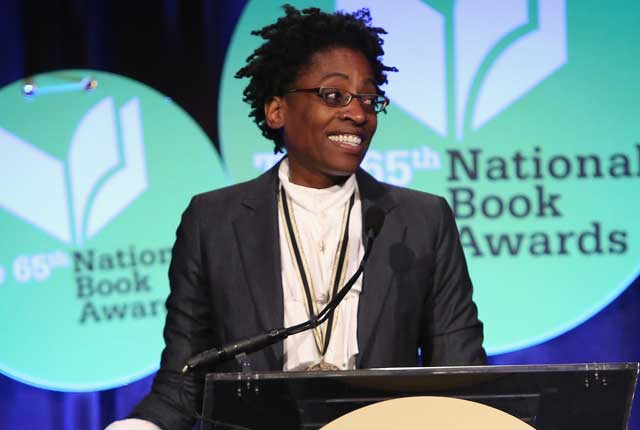"The publishing industry on which my work depends is 89 [percent] white," writes poet and Buzzfeed LGBT editor Saeed Jones in a new essay about stumbling through that prickly terrain as a young, black writer. Jones, 29, was referencing a 2014 industry survey in which 3 percent of employee respondents described themselves as Asian and Hispanic, respectively, while 1 percent identified as African-American. And in looking for guidance from the experiences of past luminaries like Gwendolyn Brooks and James Baldwin, Jones ends up posing a question: well, how exactly has publishing improved since the 1950s? (It’s the same one raised late last year after a watermelon joke greeted African-American winner Jacqueline Woodson during the National Book Awards.)
In his essay "Wallace Stevens After Lunch," poet Kevin Young notes that while having lunch with the other 1952 National Book Award judges, Stevens looked at the photograph of the poet Gwendolyn Brooks — the first black person to win the Pulitzer Prize, in 1950 — and said, "Who’s the coon?" Noticing the other judges — all white men — shifting in their seats with discomfort, he added, "I know you don’t like to hear people call a lady a coon but who is it?" Brooks had been on the NBA judging committee that had given the hallowed award to Stevens for poetry the previous year.
These moments in literary history are usually segregated to the footnotes section. Throughout my education, I never heard "Like Decorations In A Nigger Cemetery" discussed in a classroom, never talked about Wallace Stevens looking at a picture of Gwendolyn Brooks and asking, "Who’s the lady coon?" — as if racism vanishes the moment we set foot into the ivory towers and glittering soirees of the literati.
Read more of Jones’ essay on Buzzfeed, as well as more about him and his new $12,000 emerging writers fellowship aimed at diversifying media:
When we expect young writers to get experience via unpaid internships, we’re actually saying we want only wealthy people writing about American culture in an influential way. That’s what we get, right? Or rather, that’s what we’ve gotten used to accepting as normal when in fact, it’s a kind of fiction. Diversity is reality. So, in order to do my part to support being in step with reality, I’m really excited about creating an opportunity for emerging writers to get experience and mentorship while also receiving financial support. You can’t expect someone to do their best work if they’re exhausted and broke. Well, maybe you can expect it but doing so strikes me as a bit cruel.
